-
 Art of Wellness Acupuncture & Traditional Chinese Medicine (TCM)11704 Wilshire Blvd, Suite 295, Los Angeles, CA, 90025
Art of Wellness Acupuncture & Traditional Chinese Medicine (TCM)11704 Wilshire Blvd, Suite 295, Los Angeles, CA, 90025
myartofwellness@gmail.com310-451-5522 Office Hours
MonClosedTue7:30 am --4 pmWed7:30 am --4 pmThu7:30 am -- 4 pmFri7:30 am -- 4 pmSat7:30 am -- 4 pmSunClosedOur office opens from Tuesdays to Saturdays 7:30 am to 4 pm, will be closed on Memorial day, Independent day, Labor day, Thanksgiving day, Christmas and New year.
-
Recent Posts
- How to Treat Dysautonomia With Acupuncture and TCM
- How to Treat Myofascial Pain Syndrome With Acupuncture and TCM
- How to Treat Costochondritis With Acupuncture and TCM
- How to Treat Ankylosing Spondylitis With Acupuncture and TCM
- How to Treat Gastroparesis With Acupuncture and TCM
- How To Treat Sleep Apnea With Acupuncture and TCM
- How To Treat Baker’s Cyst With Acupuncture and TCM
- How to Treat Sinusitis With Acupuncture and TCM
- How To Treat Sjogren’s Disease With Acupuncture and TCM
- How to Treat Raynaud’s Syndrome With Acupuncture and TCM
- How to Treat Autoimmune Disorders With Acupuncture and TCM
- Chinese New Year 2024 Year of the Dragon
- Sign up to receive news and updates and get my free report:“The Top 10 Reasons to Try Acupuncture”

kidney
How To Treat Addison’s Disease With Acupuncture and TCM
By Qineng Tan, L.Ac,. Ph.D. and Xiaomei Cai, L.Ac., Ph.D.

Always tired? Craving salty foods? Thirsty all the time? Adrenal fatigue? Addison’s disease is a condition in which the adrenal glands do not produce enough cortisol. Acupuncture and TCM can help to balance the adrenal hormones and relieve adrenal insufficiency symptoms.
Addison’s, also known as adrenal insufficiency, happens because of damage to the adrenal glands. What do the adrenal glands do? The adrenals are small glands that are located just above the kidneys. They produce hormones, including cortisol and aldosterone. These hormones are important in metabolic functions, and are also a big part of our stress response.
Cortisol is released from the adrenal glands into the bloodstream, and it aids in the body’s use of macronutrients: protein, carbohydrates, and fats. Cortisol regulates blood pressure and blood sugar levels, and it also gives us an extra energy boost when we need it because of sudden and/or stressful circumstances.
In many cases, Addison’s disease is the result of an autoimmune disorder. In these cases, the immune system mistakenly attacks the adrenal cortex, the part of the adrenal glands that produce cortisol and aldosterone.
In some parts of the world, tuberculosis infection is still common, and tuberculosis can lead to damage of the adrenal glands.
Other infectious diseases like HIV/AIDS, or fungal infections like histoplasmosis, can cause adrenal damage.
People with other autoimmune diseases may be more susceptible to developing Addison disorder, too. For example, Addison’s disease can happen concurrently with:
- Dermatitis herpetiformis
- Graves disease
- Type 1 diabetes
- Pernicious anemia
- Hashimoto’s disease, thyroiditis
- Vitiligo
- Myasthenia gravis
Some people may develop Addison’s disease in addition to having hypothyroidism or diabetes.
Addison’s Disease Symptoms
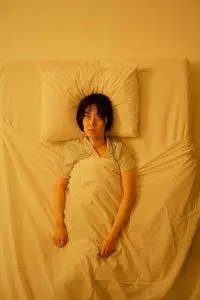
In the early stages, Addison’s disease symptoms may feel like a flu, causing fatigue, muscle weakness and joint pain. But as the illness progresses, these symptoms may become chronic.
Adrenal insufficiency symptoms include:
- Extreme fatigue
- Dehydration
- Loss of appetite
- Unexplained weight loss
- Darkening of skin in areas, hyperpigmentation, darkening of gums
- Blue-black color to skin around mouth, nipples, or genitals
- Low blood pressure, hypoglycemia
- Dizziness
- Fainting, light-headedness
- Craving salt
- Abdominal pain
- Nausea, vomiting
- Diarrhea
- Joint pain
- Muscle pain
- Depression
- Irritability
- Loss of body hair
- Sexual problems
- Irregular periods, no menstrual periods, missed periods
Primary ovarian insufficiency (POI), has been found to be more common among those with Addison’s disease, with about 1 in 10 women with Addison’s going through early menopause (before 40).
In extreme situations, Addison’s sickness can lead to kidney failure, or going into shock. Early warning signs of adrenal crisis include nausea, fever, headache, and confusion. This sudden worsening of Addison’s disease is known as Adrenal crisis, and requires immediate medical attention.
Medical Treatment for Addison’s Disease
Accurate diagnosis and appropriate treatment are crucial for individuals with Addison’s disease.
A doctor will typically diagnose Addison’s disease through blood tests. These tests measure the levels of cortisol and aldosterone in the blood. Low levels of these hormones are indicative of adrenal insufficiency.
If blood tests suggest adrenal insufficiency, an ACTH stimulation test may be performed. In this test, synthetic adrenocorticotropic hormone (ACTH) is administered, and cortisol levels in the blood are measured. Patients with Addison’s disease typically do not show a significant increase in cortisol after receiving ACTH.
The primary treatment for Addison’s disease involves hormone replacement therapy. Patients are prescribed synthetic cortisol (usually hydrocortisone or prednisone) to replace the insufficient natural cortisol production.
If aldosterone production is also insufficient, patients may be prescribed fludrocortisone to replace this hormone. This helps regulate salt and water balance in the body.
Dosage and frequency of cortisol replacement are adjusted to meet the specific needs of each patient. Patients often need to take multiple doses of medication daily to mimic the body’s natural cortisol rhythms.
These steroid medications can cause side effects like dizziness, nausea, and changes in the menstrual cycle.
Patients with Addison’s disease require ongoing medical supervision to monitor hormone levels, adjust medication as needed, and ensure that they are responding well to treatment.
Acupuncture offers an adjunct or alternative treatment for Addison’s disease that can help regulate hormones.
Can Acupuncture Help Addison’s Disease?
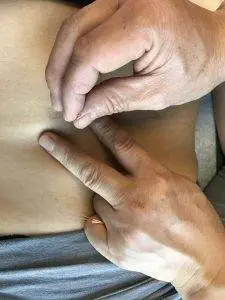
According to TCM theory, the kidneys are responsible for storing and controlling not only Qi, but “essence,” which represents a person’s foundational life force energy.
Addison’s disease, or adrenal insufficiency, is usually related to some variation of kidney deficiency according to TCM diagnosis.
Possible TCM diagnosis for Addison’s might be:
- kidney qi deficiency
- kidney yang deficiency
- kidney yin deficiency
- liver yin deficiency
- spleen blood deficiency
- spleen yang deficiency
By listening to a person’s range of symptoms, an acupuncturist will determine which pattern is emerging, and choose acupuncture points to bring energy and strength to the affected organs.
Moxibustion treatment is also an excellent modality to help build up Kidney Qi and blood.
Chinese herbs can help nourish and support kidney Qi.
For some people, acupuncture treatment and herbal supplements can be a good alternative treatment for Addison’s disease. For others, TCM treatment for adrenal insufficiency can be used as an adjunct to conventional treatment, and help to alleviate side effects of steroids, like dizziness, nausea, or menstrual changes.
Acupuncture Near Me for Addison’s Disease in West Los Angeles
Acupuncture can help address autoimmune diseases that are difficult for conventional medicine to treat. TCM modalities, including moxibustion and herbs, can provide a holistic treatment that works on the root level, restoring proper function of the immune system, as well as helping to relieve all kinds of symptoms.
Addison’s disease requires an individualized approach. Dr. Tan and Dr. Cai at Art of Wellness Acupuncture have over three decades of experience helping patients overcome all types of autoimmune disorders. Art of Wellness was recently named one of the top acupuncture practices in Los Angeles. Please do not hesitate to call us.
*This article is for education from the perspective of Traditional Chinese Medicine only. The education provided by this article is not approved by FDA to diagnose, prevent, treat and cure human diseases. It should not stop you from consulting with your physician for your medical conditions. Traditional Chinese Medicine is based on Qi, which is an invisible force that usually cannot be observed by modern science. Because science focuses on testing ideas about the natural world with evidence obtained through observation, these aspects of acupuncture can’t be studied by science. Therefore acupuncture and Chinese herbs are often not supported by double-blind, randomized trials, and they are considered alternative medicine therapies in the United States.
How to Treat Hashimoto’s Disease With Acupuncture and TCM
By Qineng Tan, L.Ac., Ph.D. and Xiaomei Cai, L.Ac., Ph.D.
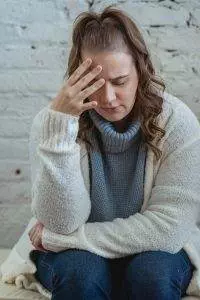
Goiter, enlarged thyroid? Tired all the time, feeling weak, sensitive to cold? Constipation, weight gain, hair loss? These can all be hypothyroidism symptoms. Hashimoto’s disease is an autoimmune disorder that causes low thyroid symptoms. Acupuncture and TCM can offer an alternative hypothyroidism treatment and address Hashimoto’s thyroiditis symptoms.
Recent data shows that hypothyroidism is fairly common. In the U.S., where it was previously thought that about 5% of the population may have some signs of hypothyroidism, more recent research shows that that number is over 10%. While people of all ages can have signs of hypothyroidism, it is most common among women over 50.
The thyroid and the pituitary gland work to release various thyroid hormones that control metabolism and other processes. The primary thyroid hormones are thyroxine (T3) and triiodothyronine (T4); Thyrotropin (TSH) is the hormone that stimulates the production of T3 and T4.
The normal TSH level for most adults is in the range of 0.27 – 4.2 uIU/mL. Lower TSH levels are often a sign that the body is producing too much thyroid hormone, which leads to symptoms of hyperthyroidism, which is often due to Graves disease, which is also an autoimmune thyroid disorder.
When TSH levels are high, there is probably too little thyroid hormone, or low thyroid hormone levels. Hypothyroidism is considered “overt” when a person has high TSH levels and low T4 levels. A person is considered to have subclinical hypothyroidism when their TSH is elevated, but T4 is in the normal range.
Hashimoto’s disease, also known as chronic thyroiditis, is the most common cause of hypothyroidism, but because it is a slowly progressing autoimmune disorder, it can take years for symptoms for thyroid to show up.
Hypothyroidism causes, or risk factors for Hashimoto, include: genetics, changes in hormones during pregnancy, and the presence of other autoimmune diseases. It is possible to have Hashimoto’s thyroiditis and also have another autoimmune condition, such as Rheumatoid arthritis, Celiac Disease, Lupus, or Type 1 Diabetes.
In some cases, hypothyroidism can be caused by an iodine deficiency in the diet. This is rare in the U.S., though, and iodine supplementation is not helpful in cases of hypothyroidism that are not caused by a lack of iodine.
Acupuncture and TCM are excellent modalities for treating all kinds of autoimmune disorders, because they work holistically to treat both the root causes of the problem, and hypothyroid symptoms.
Top 10 Hashimoto Disease Symptoms
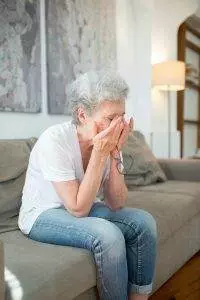
Signs of thyroid issues can take a long time to become severe enough that people notice them and seek diagnosis and treatment. Hypothyroidism symptoms can just seem like “normal” fatigue or other signs of aging.
Sometimes when people visit their primary care doctor, and they run a typical panel of blood tests, thyroid hormone levels are still in the normal range, so no treatment is recommended.
However, hypothyroidism symptoms typically come on gradually, and will likely get worse with time, as the disease progresses.
Hashimoto’s Disease Symptoms include:
- Fatigue, sluggishness, tired all the time
- Drowsiness, sleepy all the time
- Increased sensitivity to cold, feel cold all the time
- Dry skin, brittle nails, hair loss, puffy face
- Muscle pain, muscle stiffness, muscle weakness, joint pain, stiff joints
- Swollen thyroid, enlarged thyroid gland, goiter, swollen tongue
- Memory problems, difficulty concentrating, foggy head
- Change in menstrual cycle, irregular menstruation, heavy bleeding during period
- Weight gain
- Depression, mental health problems
If hypothyroidism is not treated, it can lead to serious complications. These may include: heart problems or cardiovascular diseases, like irregular heartbeat (arrhythmia) and high cholesterol.
Hashimoto’s can cause problems with sexual function, libido, and fertility in both men and women.
In rare cases, people with untreated low thyroid levels can develop Myxedema. Myxedema is the term for advanced, severe hypothyroidism, which can lead to:
- Low blood pressure
- Low heart rate
- Low blood sodium levels
- Low blood oxygen levels
- Low body temperature (hypothermia)
- Mental confusion
In extreme cases, Myxedema can lead to a health crisis in which a person may go into shock, a coma, or seizures. Myxedema crisis requires immediate emergency care.
Hypothyroidism can develop slowly, with minimal symptoms. However, it is important to get proper diagnosis and treatment for Hashimoto’s thyroiditis. As time goes on, untreated hypothyroidism can lead to more complications.
Medical Treatment for Hashimoto’s Disease
Getting a diagnosis for Hashimoto’s disease will usually involve a series of blood tests. As an autoimmune disorder, Hashimoto involves the production of antibodies that mistakenly attack healthy cells. In the case of Hashimoto’s thyroiditis, an antibody test may show that the immune system is making TSO antibodies. Thyroid peroxidase (TSO) a protein that is vital to the production of thyroid hormone.
In addition, blood tests will show if there is elevated TSH and/or low levels of T4. If a person has symptoms, or an enlarged thyroid gland, and high TSH levels, then a diagnosis of Hashimoto’s may be made, whether or not the T4 levels are low.
An ultrasound can indicate that there is swelling or inflammation in the thyroid gland.
Hypothyroidism Medication
The usual treatment for Hashimoto’s disease is hormone replacement. Levothyroxine, under the brand names Levoxyl, or Synthroid, is usually given in pill form. This hypothyroid medication mimics the action of T4 hormone.
For many patients, medications for low thyroid will help to stabilize the TSH and T4 levels, and symptoms will improve. However, for some people, the continued autoimmune disorder process continues to cause symptoms, even when thyroid hormone levels are in the normal range.
In these cases, doctors may recommend surgery. A thyroidectomy involves the removal of some or all of the thyroid gland. After a thyroid surgery, a person will need to continue taking thyroid hormone replacement medication, as they will not produce any without the thyroid gland.
Acupuncture and TCM treatment offer an alternative or adjunct therapy for Hashimoto’s disease, which can help improve immune function and address symptoms.
Can Acupuncture Help Hashimoto’s?
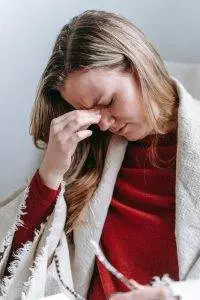
Acupuncture works by harmonizing the Qi (life force energy) of the organ systems of the body. When Qi is out of balance, then some bodily processes happen in excess, and others are deficient. A TCM practitioner observes and listens carefully to each person’s individual experience of symptoms to discover which organs are out of balance.
In the case of hypothyroidism and Hashimoto’s, deficiency of Qi and blood can be building up over a long period of time, and gradually begin to impact organs: mainly, the kidneys, spleen, and heart.
For a while, while the condition is still what conventional medicine considers to be subclinical hypothyroidism, the spleen Qi is weak, and causes some symptoms, like weakness and fatigue.
Then, as the situation progresses, the kidney Qi is affected, and more symptoms begin to occur. Yang Qi is not able to warm the organs enough, so dampness and cold begin to accumulate. This causes symptoms like constipation, swollen joints, brain fog, and memory problems.
Chronic kidney and liver qi deficiency can cause menstrual problems, and infertility.
If the problem continues, then the heart is affected, too, and cardiovascular symptoms begin to arise, like palpitations, respiratory problems, and low blood pressure.
The acupuncturist deduces from the pattern of symptoms which organs are affected, and then uses acupuncture treatment, herbs, and other modalities like cupping or moxibustion to bring more energy to depleted areas and help nourish them.
Can TCM cure hypothyroidism? Not exactly, but research has shown that acupuncture is a safe and effective treatment for thyroid disorders, whether it is used as an alternative medicine for Hashimoto’s disease, or as an adjunct therapy.
Case studies have shown that regular acupuncture treatment can help stabilize thyroid hormone levels, slow the progression of the autoimmune disease, reduce symptoms, and improve quality of life.
For those who are trying to conceive and are struggling with infertility issues due to thyroid disorders, acupuncture can be a holistic treatment that helps balance hormones and improve fertility. Acupuncture treatment may help prevent miscarriage due to autoimmune conditions.
Acupuncture can also be helpful for pain management after a thyroidectomy procedure.
Acupuncture Near Me for Hashimoto’s Disease – West Los Angeles Area
Acupuncture is an excellent modality for helping to treat many autoimmune diseases and thyroid conditions, including Graves disease, hyperthyroidism, and chronic fatigue syndrome. TCM can also help with menopause and perimenopausal symptoms, which often occur concurrently with hypothyroidism in women over 50. Acupuncture can also help with all kinds of mental health problems like depression and anxiety, which may be related to underlying physical conditions.
*This article is for education from the perspective of Traditional Chinese Medicine only. The education provided by this article is not approved by FDA to diagnose, prevent, treat and cure human diseases. It should not stop you from consulting with your physician for your medical conditions. Traditional Chinese Medicine is based on Qi, which is an invisible force that usually cannot be observed by modern science. Because science focuses on testing ideas about the natural world with evidence obtained through observation, these aspects of acupuncture can’t be studied by science. Therefore acupuncture and Chinese herbs are often not supported by double-blind, randomized trials, and they are considered alternative medicine therapies in the United States.
How to Treat Kidney Stones With Acupuncture and TCM
By Qineng Tan, L.Ac., Ph.D. and Xiaomei Cai, L.Ac., Ph.D.

Severe lower back pain, blood in urine, burning pee? These could be signs of kidney stones. Acupuncture and TCM offer an alternative or adjunct kidney stones treatment that can help relieve kidney stone pain and dysuria, or painful urination.
Kidney stones are hard mineral deposits that form in the kidneys or other parts of the urinary tract. Salt and minerals can crystallize when urine reaches a certain level of concentration.
Often, kidney stones form when there are calcium oxalate crystals in urine. Calcium levels can be high because of eating too much sodium.
The ureters are the tubes that connect the kidneys to the bladder. If a kidney stone moves into a ureter and becomes lodged there, it can cause left lower back pain or right lower back pain. This is known as “passing a kidney stone.”
Kidney stones are very common, and many people go to the ER when they are experiencing severe lower back pain on one side and peeing blood. This happens when one or more kidney stones find their way into one of the ureters and become lodged there. This blocks the flow of urine and can cause severe pain and cramping.
Acupuncture can help reduce kidney stone pain in the short term, and help address the imbalances that are the root cause of kidney stones.
What Causes Kidney Stones?

Kidney stones form when there is not enough urine, and it becomes too concentrated. This often is due to not drinking enough fluids and getting dehydrated. Other kidney stone causes include:
- Not drinking enough water, dehydration
- Too much salt
- Too much sugar, fructose, or high fructose corn syrup
- Too much meat, too few fruits and vegetables
- Lack of exercise or too much exercise
- weight loss surgery, bariatric surgery, which can cause chronic diarrhea
- Infections, UTIs
- Gout
- Chronic diarrhea due to Crohn’s disease, ulcerative colitis
- Type 2 Diabetes, high blood sugar levels
Kidney stones are differentiated into different types, depending on their mineral composition. The types of kidney stones are:
- Calcium stones – deposits of calcium oxalate or calcium phosphate
- Uric acid stones – high levels of uric acid can be due to eating a lot of animal proteins
- Struvite stones – can form after a UTI
- Cystine stones – cystinuria is an inherited condition that causes buildup of the amino acid cystine in the urinary tract
Top 10 Symptoms of Kidney Stones
Many people have kidney stones and are not aware of them. It is possible to have kidney stones without pain or kidney stones without urinary symptoms. You may only find out about them when having imaging tests done for some other reason.
However, passing a kidney stone can certainly cause intense pain and other upsetting symptoms. The most common signs of kidney stones include:
- Sharp pain on one side of the lower back
- Cramps in one side
- Pain in the lower abdomen or groin
- Urgent need to pee, urinary urgency
- Peeing a lot, urinary frequency
- Burning sensation when peeing, dysuria
- Dark urine, blood in urine
- Nausea, vomiting
- Pain at the tip of the penis
- Fever and/or chills
Kidney stone pain can range from mild to severe, and it can come and go or be constant.
Acupuncture treatment has been shown to be effective for reducing kidney stone pain when used as an adjunct in emergency medical care settings when someone is waiting for conventional treatment.
Treatment for Kidney Stones
Kidney stones are diagnosed through blood tests and urine tests, which will show if there is too much uric acid, calcium, or other minerals that can cause stones to form. Imaging tests, such as ultrasound, may be able to detect where stones are stuck in the urinary tract.
If a person is passing stones (kidney stones in toilet), they may be analyzed to determine what sort of mineral has formed them.
In many cases, people will be encouraged to wait until the stones pass on their own. In this case, simply drinking adequate fluids and using pain medication to manage the intermittent pain and cramping will be recommended. Medications such as alpha blockers (Flomax) may be prescribed to help relax the ureters.
If the kidney stones are too large to be passed, then surgery may be indicated. Procedures using sound waves are sometimes used to help break up the stones. Surgery using small scopes and instruments can also remove the stones. A stent may be placed in the ureter to help keep it open until swelling goes down and it heals.
Studies have indicated that a combination of medications like Flomax and Chinese herbs may help to expel kidney stones. TCM treatment can help prevent the need for surgery.
Can Acupuncture and Herbs Help Kidney Stones?
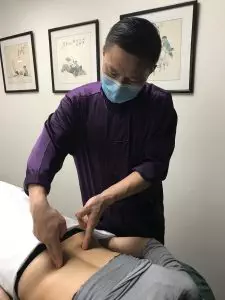
According to TCM theory, kidney stones are in the category of “Shilin” conditions, in which urination is difficult. Chinese herbs have traditionally been used to help balance the electrolyte minerals in the body, which helps prevent stones from forming in the urinary tract.
TCM treatment for kidney stones includes herbal medicine to help increase urine volume and excretion of minerals and inhibits the formation of calcium crystals.
Acupuncture treatment has an anesthetic effect which can help relieve the pain of kidney stones while other treatments take effect to help reduce and prevent the formation of new kidney stones.
One trial found that acupuncture treatment helped relieve kidney stone pain faster than pharmacological medications. Acupuncture treatment has no side effects, while 43% of the people in the study who were given intramuscular anesthesia report side effects like skin rash, irregular heartbeat, and drowsiness.
Acupuncture and acupressure can help relieve severe back pain and pelvic pain due to various urinary and other reproductive system conditions. It can also help reduce the anxiety and depression that people sometimes experience when faced with severe pain.
How to Prevent Kidney Stones
Drinking plenty of water is probably the most important thing you need to do to prevent dehydration and low volume of urine. In addition to staying hydrated, you should:
- Reduce sodium intake by eating less salt and fewer processed and packaged foods.
- Reduce foods that encourage calcium oxalate stones: meats, berries, beer, black pepper, spinach, chocolate/cocoa, and tea.
- Combine calcium-rich foods or drinks with foods that contain oxalate, so that they can be absorbed well together. This could mean eating spinach with cheese, or berries with yogurt. The citrate in citrus juices can also help discourage stone formation.
- Add foods with a high ratio of magnesium to calcium, such as: brown rice, oats, barley, bananas, soybeans, and flaxseeds.
- Be sure to replace lost fluids when you sweat through exercise or by being in a sauna, steam room, or hot tub, or just by being in the heat during the summertime.
- Balance your Ph levels. For some people this may mean increasing alkaline foods. As your acupuncturist about checking your Ph levels.
Acupuncture Near Me for Kidney Stones, Los Angeles
TCM treatment can help reduce pain and address the root causes of many conditions that cause urinary urgency and frequency, like BPH, UTIs and interstitial cystitis. Acupuncture can also help relieve pelvic pain and low back pain due to many other conditions, like endometriosis, and mittelschmerz. If you are experiencing urinary symptoms or recurring bladder pain or back pain, consider consulting an experienced acupuncture practitioner to resolve the root issue.
*This article is for education from the perspective of Traditional Chinese Medicine only. The education provided by this article is not approved by FDA to diagnose, prevent, treat and cure human diseases. It should not stop you from consulting with your physician for your medical conditions. Traditional Chinese Medicine is based on Qi, which is an invisible force that usually cannot be observed by modern science. Because science focuses on testing ideas about the natural world with evidence obtained through observation, these aspects of acupuncture can’t be studied by science. Therefore acupuncture and Chinese herbs are often not supported by double-blind, randomized trials, and they are considered alternative medicine therapies in the United States.
How to Treat Muscular Dystrophy With Acupuncture and TCM
By Qineng Tan, L.Ac., Ph.D. & Xiaomei Cai, L.Ac., Ph.D.
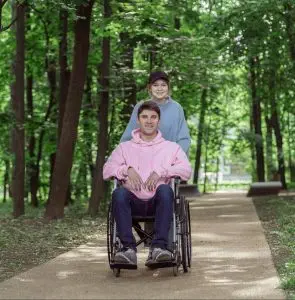
Progressive muscle weakness and muscle atrophy (loss of muscle mass) are the primary symptoms of Muscular Dystrophy. Acupuncture and TCM offer an alternative treatment to prevent muscle atrophy and treat complications of muscular dystrophy.
Muscular Dystrophy refers to a group of genetic muscle diseases that cause damage to muscles and lead to decreased flexibility and movement.
There are several types of Muscular Dystrophy. Some types of muscular dystrophy are more likely to show up during childhood, while others may develop later in life.
The most common type is Duchenne Muscular Dystrophy (DMD). Duchenne muscular dystrophy can lead to muscle wasting, limited mobility, and other complications with breathing and heart function. Duchenne most often affects boys and starts showing up in early childhood.
Becker muscular dystrophy is similar to Duchenne, but less common, and generally leads to milder symptoms of muscular dystrophy.
Muscular dystrophy of all types is caused by genetic mutations, usually inherited. These mutations affect muscular development and growth by blocking certain proteins in the body from performing their usual functions of building and maintaining muscle mass.
Muscular dystrophy is a progressive disease, which means that trouble with walking and other complications will get worse as a person gets older. Muscle weakness can affect the limbs and trunk, and can also affect the major internal organs, like the heart, lungs, and the muscles involved in swallowing. Muscles can shorten and tighten (contractures), causing them to pull on tendons and cause joint problems.
Both conventional medical treatments and alternative treatments are aimed at helping to slow the progress of the disease, maintaining maximum motor control, and keeping organs as healthy as possible.
Symptoms of Muscular Dystrophy
The signs and symptoms of muscular dystrophy vary, depending on the type of genetic mutation, and therefore, the type of muscular dystrophy.
The most common signs of muscular dystrophy include:
- Difficulty getting up from sitting or lying down
- Trouble walking, walking on toes, or waddling gait
- Falling frequently, stumbling
- Muscle pain, stiff muscles
- Enlarged calf muscles
- Learning difficulties, delayed development, difficulty concentrating
- Breathing problems, shortness of breath
- Heart problems, myocardiopathy
- Trouble swallowing
- Curved spine, scoliosis
- Drooping eyelids, vision problems, cataracts
Big calf muscles are common among people with DMD and Becker type muscular dystrophy. This is known as pseudohypertrophy, or calf hypertrophy, and is an abnormal development of the lower legs that happens in conjunction with the wasting of other muscles in the pelvis and thighs. With muscular dystrophy, healthy muscle can go through a pattern of inflammation that replaces healthy muscle cells with fat and scar tissue.
As people with muscular dystrophy age, they may begin to have more problems with respiratory function and/or heart problems like cardiomyopathy (scar tissue damage to the heart muscles) or arrhythmia (irregular heartbeat). Because the lungs are weaker, a person may be more susceptible to serious respiratory infections, like pneumonia.
Some kinds of muscular dystrophy can cause digestive problems, infertility, and cataracts.
Even amongst people who have the same type of muscular dystrophy, the symptoms and complications can look very different in each individual.
Top 6 Types of Muscular Dystrophy
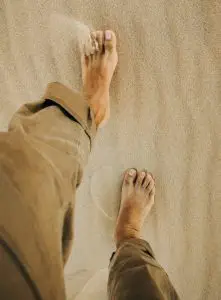
The different kinds of muscular dystrophy are caused by different genetic mutations that affect muscle development and function in different areas of the body. Some types show up early in life, and others may not develop until well into adulthood.
- Duchenne Muscular Dystrophy (DMD) – This is the most common type of muscular dystrophy, and occurs most often in boys, becoming apparent in early childhood. As a result, many young patients with DMD will show slow growth and motor development; they may walk late, tend to fall often, and have to use their hands more than usual to help them get up again.
- Becker Muscular Dystrophy – This type tends to begin the late teen or early adult years. Similar to DMD, a person will first notice weakness in the muscles, leading to more and more difficulty getting up and walking. Later, it can lead to heart problems.
- Myotonic Dystrophy – also known as DM (dystrophia myotonia). Categorized into 2 separate genetic disorders, DM1 (once known as Steinert disease) and DM2 (also known as Ricker syndrome, proximal myotonic dystrophy, or PROMM). DM develops in stages, and can affect the eyes, causing cataracts, and droopy eyelids. Uncontrollable muscle contractions (myotonia), muscle pain, and fatigue are other possible symptoms of myotonic dystrophy, as are hair loss, loss of facial expressions due to flaccid muscles in the face, and slurred speech.
- Facioscapulohumeral Dystrophy (FSHD) – a specific type of dystrophy that often develops slowly and can be difficult to diagnose. It can involve loss of muscle mass, starting in the face and spreading to the upper body, especially the shoulder blades, often affecting the body asymmetrically. People with FSHD may have trouble with small motor functions, like pursing their lips to drink, closing eyes all the way, weakness in the hands, difficulty picking up the feet when walking (foot drop).
- Congenital Muscular Dystrophy – CMD is a more general term referring to different kinds of muscular dystrophy that are apparent at birth, causing lack of muscle tone (hypotonia, or “floppy baby” syndrome), atrophy, contractures (shortening of muscles), scoliosis (curving of the spine), as well as respiratory problems.
- Limb-Girdle Muscular Dystrophy (LGMD) – a group of muscular dystrophies that primarily affect the muscles around the shoulders and hips.
Medical Treatment for Muscular Dystrophy
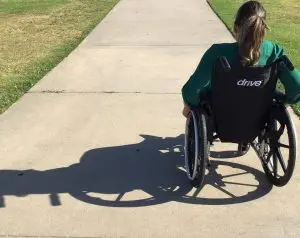
Muscular dystrophy can sometimes be difficult to diagnose. Other diseases, like ALS, multiple sclerosis, may also cause muscle weakness and atrophy.
People with muscular dystrophy need continual monitoring, and treatment options aim to manage the various symptoms and complications. Physical therapy, speech therapy, and occupational therapy can help people maintain as much flexibility, strength, and functionality as possible.
Steroids are often used to help maintain muscle and respiratory function, but many people with muscular dystrophy will end up needing to use aids, such as a cane or wheelchair, or a ventilator to help with breathing. Patients may need to be on heart medications to control blood pressure or arrhythmia. In some cases, surgery may be needed to correct severe contractures or scoliosis.
Acupuncture and TCM can be used as an adjunct to conventional treatments, and may help to maintain muscle mobility, improve pulmonary function, nervous system function, cognitive function, and to reduce inflammation.
Can Acupuncture Help Muscular Dystrophy?
TCM offers a different way of looking at disease. The conventional medicine view of muscular dystrophy is that it is an incurable genetic disease, and the progressive worsening of symptoms and complications stems from that.
In the TCM view, we see patterns of symptoms that show up in different ways in different people, according to their constitution. Long before we had a modern understanding of genetics, TCM observed that some people are born with deficiencies of certain types of organ Qi.
So, the TCM practitioner is looking for a pattern of symptoms, and how that interplays with a person’s foundational health. In the case of muscular dystrophy, it is not just that problems in the organ systems occur because of the progressive muscle atrophy; the dysfunction in the organs is occurring due to an inherited deficiency, and contributing to muscle atrophy.
When we see weak muscles, diminished muscle mass, and even paralysis, this falls under the category of Wei Zheng conditions.
Other Wei Zheng illnesses include:
- Ataxia
- Myelitis
- Myasthenia gravis
- Multiple sclerosis
Although they may have similar symptoms, different Wei Zheng illnesses can arise from problems with varying organs, including the liver, spleen, stomach, or kidneys. So, according to TCM, different types of muscle diseases require differentiated treatments.
TCM views muscular dystrophy as being related to an innate deficiency of Yuan Qi, or kidney energy. In Western medicine, the kidneys are thought to mainly have to do with the urinary system, but in TCM, “Kidney Qi” is a much broader concept.
Kidney Qi is inherited from our parents; it governs the growth and strength of the body. Kidney deficiency is also considered to affect cognitive function and memory, infertility, and hair loss.
Kidney problems are common among adults with DMD, but in medical science, it is considered to be a long-term complication of muscular dystrophy, as opposed to being foundationally related to it.
So, TCM diagnosis and treatment for muscular dystrophy will aim to strengthen the kidneys, spleen, and other organs, while also stimulating and nourishing the muscles, tendons, and nervous system.
The acupuncturist will look at the specific range of symptoms presenting in each person, and plan a treatment course to include modalities such as acupuncture, tuina massage, herbal supplements, and nutrition.
Everything is also affected by the environment and lifestyle. Foods that nourish the Kidney Qi, a regimen of gentle exercises, and meditation can help maintain better overall functioning.
A case study involving a woman with FSHD showed a significant improvement in facial muscle coordination after a course of acupuncture treatment.
A research study showed that acupuncture helped to slow the loss of muscle mass.
Acupuncture Near Me for Muscular Dystrophy in Los Angeles, Westside
At Art of Wellness Acupuncture and TCM in West L.A., we have over 30 years of experience helping people manage musculoskeletal pain and weakness of all kinds. Acupuncture treatment can help prevent the worsening of degenerative disease and improve well-being for people suffering from many types of chronic illness.
*This article is for education from the perspective of Traditional Chinese Medicine only. The education provided by this article is not approved by FDA to diagnose, prevent, treat and cure human diseases. It should not stop you from consulting with your physician for your medical conditions. Traditional Chinese Medicine is based on Qi, which is an invisible force that usually cannot be observed by modern science. Because science focuses on testing ideas about the natural world with evidence obtained through observation, these aspects of acupuncture can’t be studied by science. Therefore acupuncture and Chinese herbs are often not supported by double-blind, randomized trials, and they are considered alternative medicine therapies in the United States.